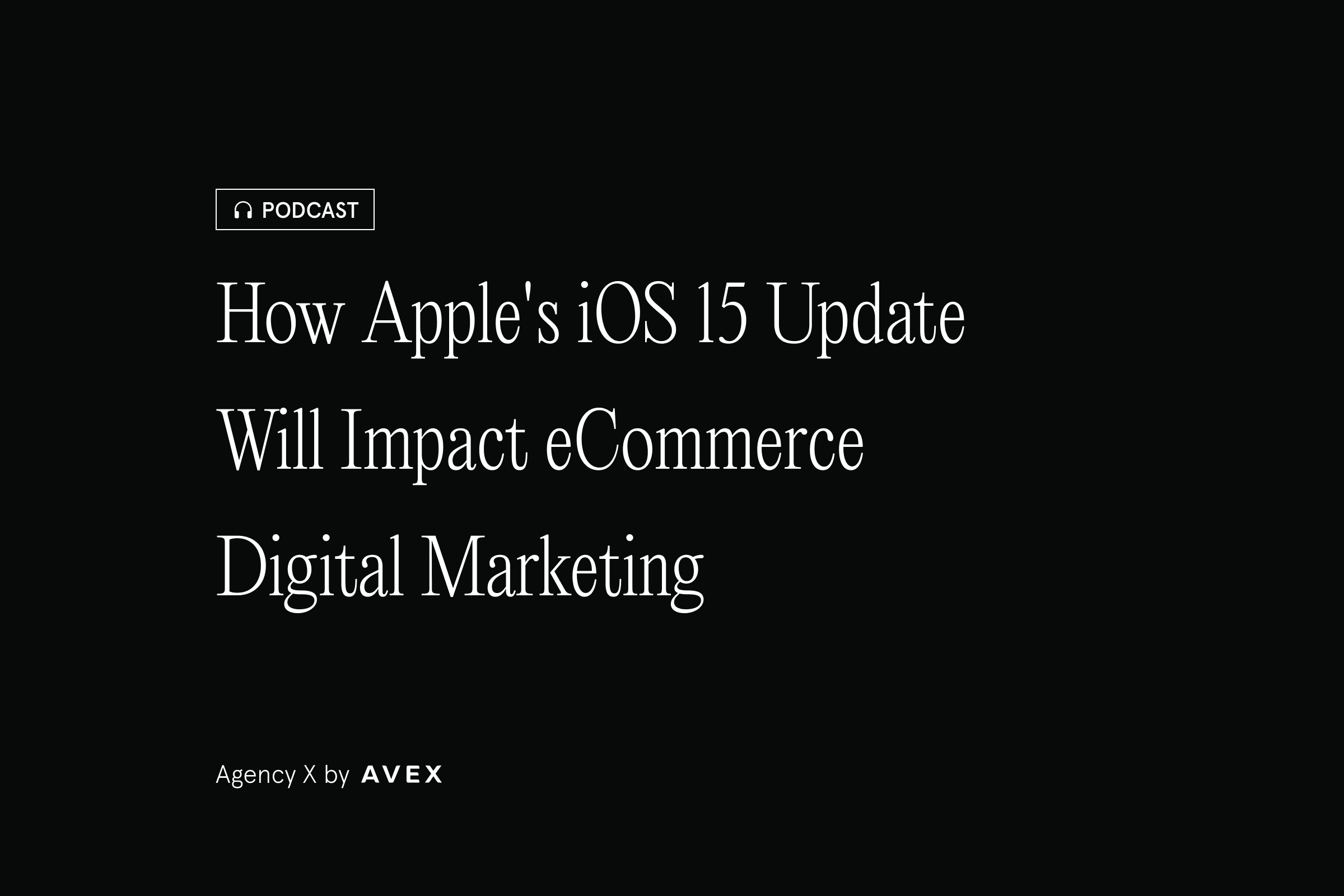Agency X Podcast: How Apple's iOS 15 Update Will Impact eCommerce Digital Marketing

Quick Summary John Surdakowski and David Anzalone discuss the new iOS 15 features and how they will shape the future of both paid ads and email marketing.
Below are highlights from our podcast episode on all things iOS 15. You can find the conversation’s audio here.
Aspects of the iOS 15 Update
iOS 15 Concerns
David 2:55 - 3:45 You have a huge bombshell like this, where essentially the message is, Apple is rolling out an update that is going to make it more difficult for you to track attribution and conversion rate from ads. It goes deeper than that, but high level, as far as most eCommerce merchants will be concerned, that's really the big focus.
The concern makes sense, because not only does it affect insight opportunities, but the less data you collect, the less you have to use when making decisions. Then, as I said before, for attribution accuracy, if you can't know with certainty that your efforts (paid and organic) are generating an ROI, that's of course going to cause understandable frustration.
Penalizing Gimmicks
David 7:51 - 10:09 These updates are really nothing new. If you can recall a while back with Google, they're always updating how they rank SEO, and most of their updates are designed to dissuade and even penalize people for using seedy tactics like having white text in the background, repeating like a keyword, which worked for a time but didn't benefit the user. Again, it was very gimmicky. You see this too with Google Ads with how they do ad quality ranking, that it's not so linear anymore, where we don't even really know how a lot of these systems rank performance.
What we do know, and this is where I think the future of tracking and ranking algorithms are heading, is I think we're getting to a point where we never will and probably never should understand how these systems work and how they calculate and rank performance. It's based on a combination of metrics and data points that are overall benefiting the user. With Google, going back to that example for SEO and paid ads, we have ad quality or just content quality for the SEO side, it's all about the quality of information and how much it benefits the user and customer experience overall.
While back then it was harder to create things that could actually objectively measure that, a lot of these companies are doing things that you and I can't even fathom that's going to benefit everybody because when you think about it, the people that are affected most negatively from these updates are the people that are resorting to these gimmicky hacks to gauge performance. This is true with both email and ads and any update that forces positive change to best practices is going to benefit everyone overall.
Less Tracking ≠ Less Open Rates
David 22:04 - 22:56 When I work out I like to put on the Apple Watch fitness tracker, knowing that it's probably not the most accurate, but it's still something I like to have even just going on walks. Recently I've started to not do that as much because realistically, regardless if your watch is tracking our workout or not, you still completed the workout. It still technically happened, you just don't have objective proof that it happened on paper.
Metaphorically, it’s the same with this situation, especially with iOS 14.5. With 15, the email bounce thing that's a little bit different. But in terms of open rate, people will still open the email, that still happens, you just don't get it, and it's also not affecting certain metrics like click-through rate or conversion rate metrics that arguably matter a bit more.
Why Apple is Updating Customer Privacy
How Brands Can Stand Out
John 6:12 - 7:44 I think companies like Apple are taking a step forward to say, hey, we're getting ahead of this privacy is a concern of customers. You have all these apps that collect so much data, and they rely on all this data. It's not going to last forever. So I think this is something that was just inevitable.
Now, how brands react to it is and how SaaS products like Klaviyo and some others react to anything is going to be very important because the days of just spitting up a dropshipping product and targeting the heck out of it with Facebook ads...it's not going to be real, it's not going to be a thing that you could do. As easy as it was three to five years ago, or even just last year, I think we're taking a step forward.
The brands that are focusing on brand building, the brands that are developing really great companies, they're going to be the ones that stand out. They're going to be able to navigate through this, they're not only relying on targeting ads. So I think it's going to really help the brands that are trying harder, and the ones that are doing good things. It's going to actually benefit them, where it might be a little tougher for newer brands, who rely on that amplification of paid ads to be able to get to the right people.
Apple’s Stance on Privacy
John 11:10 - 12:15 Google is going to rely on just making money off of those ads and tracking people. They're less concerned with privacy. Whereas Apple, I'm sure they're going to find a way to monetize it, but I really do believe that they actually have the customer's interest in mind, like with these privacy updates.
I don't think Google cares much about the actual customer's privacy or experience, I think that they more care about making sure ads are targeted properly because they're going to convert more, and they're going to have more click-throughs and that means more money for them. I don't know yet what Apple's financial gain is going to be from this, other than maybe people signing up or buying into the Apple ecosystem because there's better privacy with it. I know they're like the biggest company in the world, but I tend to trust Apple more than Google.
David 13:47 - 14:22 What does Apple gain from it? Not only does it make them look good, it also doesn't affect them negatively. It's affecting other platforms negatively like Google and Facebook, but Apple's not doing it in a self-sacrificing way. They're just like, this is like the user's privacy, great. That's a good thing that they can have for their brand, and it helps their own image, but it's not doing anything that's affecting them negatively. I'm not going to try to get into what companies really do, I just don't think any company does anything really for the benefit of anyone, per se.
David 25:16 - 26:49 What Apple's doing is definitely setting a precedent for themselves and for others, to give users control of their own privacy, because I think for the most part, a lot of people are aware of the subject, but they don't really know or really have the power to control it. Because if you go to a website, you might have an opt-in opt-out policy on your site, but it's usually stuffed at the bottom, like the privacy policy link, and you never really navigate towards it. And when you see that popup that says, Do you accept cookies and all that, and most people just click Yes. And in a lot of ways, I feel like a lot of people will some will opt-out. Most people by default will just be like, Sure, they don't care.
So I would say overall, if you're a merchant who's been affected by this, because you inevitably will, and you're still concerned about it, your concern is merited and warranted. The really important thing is optimizing your customer experience, user experience, making sure that you're testing things on the site, and trying to really maximize your conversion rate, AOV a lot of the KPIs that actually matter and will generally be profitable, because regardless of the ads and emails you've run, where are you running them to? You're running them to your website. You're going to want to optimize that experience, don't think that the top of the funnel is the end all be all, because it's honestly not.
The Future of Email Marketing with iOS 15
Hiding IP Addresses
John 17:27 - 18:30 With the iOS 15 update, users will have the option to load remote content privately and not disclose their IP addresses. So what does that mean? The results of that will be that the customer has the ability to block their senders view to see if they were tracked if it was forwarded. And it could also mask the customer's IP, which we know that's how you determine their physical location. It's going to be a lot harder to segment customers and target them based off of actual location, it's going to be near impossible to see if they open the email.
I think that really is going to impact testing, subject lines, testing the preheaders, even time of day and location and things like that, it's going to be harder to test them. Does it mean you can't reach them? No, but it's going to be harder to test them.
Hide My Email Feature
John 18:31 - 19:47 There's another update in there, I'm not sure of Apple's exact term for it, but I think it's called like hide my email. That has a few issues for marketers and brands. First, there's, it's not extremely easy to tell if a new email signup is legitimate and real because it could essentially be like a burner email address, so you could use a dummy email address and that's going to cause some deliverability issues. People could sign up for those popups for 10% off, and then basically get rid of the email, so that is a bit of a problem.
Subscribers can actually delete that email address and then there's going to be bounce rates in the future, so I do see a lot of issues with brands getting some bounce rates in the future from newer signups. New things like Klaviyo automatically purge those hard bounces. So the email platforms have some protection against that.
How to Handle iOS 15
John 16:05 - 16:54 You can still run your ads, not everyone uses Apple phones, so you could still be able to run those. For those paid ads, you might have to try a different approach. But I think SEO long-term should always be something that's important and even more so now, focusing on omnichannel, focusing on brand building, just have different avenues. Don't just rely on one channel to drive traffic to your site.
And of course, optimizing your site for conversions, because it's going to cost more to get customers to your site, or you might not be as targeted, you want to make sure that they actually convert. So thinking about how you can personalize things on your site and how you can optimize for conversions.
John 19:47 - 20:41 But what can merchants start doing right now before these updates start to impact everyone? Do AB testing and test the subject lines, see what's worked and what's not, and you're going to want to get as much data as you can now and get a look at the data that you've collected in the past and start implementing those things because essentially for things like testing the subject lines and seeing what worked with open rates, locations, certain segments, you may run into some problems while you're collecting that data in the future for everyone so your data is going to be skewed a bit. But it's better privacy for customers and less targeted types of ads mean less spamming, so I think it's going to be better for everyone. I think there are certain things that you can do right now to kind of collect as much data as possible before this starts to impact you.



